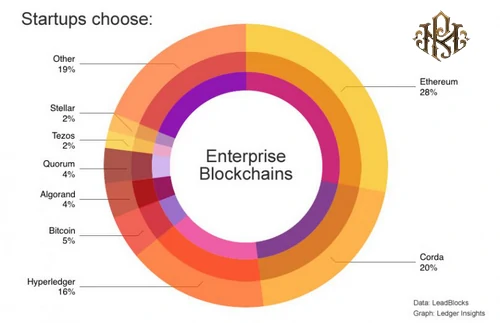
Close



Blockchain can be seen as a growing technology in the financial and digital world that allows users to decentralize peer-to-peer exchanges. The main reason for the emergence of such technology is to simplify and speed up financial transactions. One of these types of blockchain is enterprise blockchain, which is used for various developed businesses. To learn about this type of ecosystem, stay with us until the end of the article.
Enterprise blockchain can be considered one of the types of permissioned blockchain networks. This technology is used for processes such as transaction processing, asset tracking, and internal and external information sharing. Blockchain actually records and stores encrypted entries in individual blocks in a ledger.
Unlike public blockchains like Bitcoin where all users can view information, blockchain is designed for use by businesses and institutions. This technology allows various companies and institutions to restrict access and only allow certain people to edit information. Due to the high security in this network, companies such as Intel, Meta, IBM, etc. are currently using this technology in their activities.
Enterprise blockchains have different features and capabilities. Each of these networks is designed to achieve specific goals. However, most of these networks have the following features.
• Accountability: Each network node has a copy of the transaction history and therefore must be accountable for its activities.
• Private: The corporate blockchain is accessible only to authorized users. Indicates the original owner and developer of the access network.
• Scalability: Enterprise networks typically process more transactions per unit of time compared to Bitcoin.
• Distributed: The blockchain ledger can be replicated across multiple nodes and then provide the ability to distribute information across a network.
• Immutability: In the enterprise blockchain, it is not possible to change or manipulate the records approved by the user.
• Security: Data is encrypted on company blockchains to prevent hacking and fraud.
• Token-based: Tokens are a tool for carrying out financial exchanges and information interactions in organizational networks.

Companies have different needs and goals. Some platforms allow you to create your own enterprise blockchain. In fact, some networks allow developers to design their own enterprise solution using the blockchain’s original code. Next, we will discuss some of the best platforms for enterprise blockchain design.
Ethereum is an open source blockchain platform that can be used to improve transaction operations, facilitate payment processes, and accelerate or simplify information exchange.
Businesses can use Ethereum’s main (public) network or private network. Coca-Cola, Nike, and Walmart are among the companies that have chosen the Ethereum blockchain to develop blockchain-based services.
Quorum is another popular open source platform for blockchain development. Companies use this platform in various fields such as supply chain, real estate transactions and digital currency. Developers can design and run their blockchain applications with quorum on a private network or even on the Ethereum mainnet.
Hyperledger is a modular blockchain platform that enables companies to build a powerful blockchain. Increased security, transparency and peer-to-peer transaction processing are key benefits of Hyperledger. Intel and SAP Ariba are already using this blockchain to develop their applications.
Corda is an open source consortium that supports DLT applications. Using Asynchronous Byzantine Fault Tolerance (ABFT) technology, supporting smart contracts and increasing security are the main advantages of this blockchain. Banks HSBC and Bank of America use Korda blockchain for their activities.
Introduction of various organizational blockchains
In general, there are three types of enterprise blockchains. These blockchains differ in their degree of decentralization and security. Each company will use one of them depending on its conditions and needs.
Only users approved by the original owner or developer can access the private (permissioned) blockchain.
These networks have a central node to confirm transactions. So if the central node is attacked by a cyber attack, the security of the entire blockchain is at risk. High verification speed, reasonable scalability, greater information security and easier auditing are the main advantages of blockchain for private businesses.
Hybrid blockchain networks are a combination of private and public networks. The purpose of creating such blockchains is to reduce the shortcomings of each network and complement the strengths. Hybrid blockchain allows companies to store and process some access and information publicly and others privately.
• Blockchain Consortium
Consortium blockchains work like public blockchains. These networks have a decentralized and peer-to-peer structure. No legal or natural person has access to the system and all information is recorded in the distribution office. This network is a block
China is considered private because the developer and owner decide who gets on the network. Typically, these blockchains are used for collaboration between one or more organizations.
Enterprise blockchains have various advantages, some of the main ones are listed below.
Increase efficiency
Increased security
Better implementation of administrative and organizational automation
Increase transparency
Enterprise blockchain is one of the solutions of blockchain technology to improve processes and increase business income. In addition, the use of blockchain technology increases the security and transparency of information. Considering the adoption of this technology by large companies such as Walmart, Intel, JP Morgan, etc., it is likely that small businesses will also turn to enterprise blockchains in the near future. The world is moving more towards decentralization and transparency, and blockchain technology is one of the most important tools to achieve this goal.